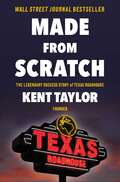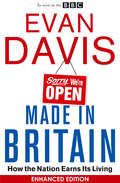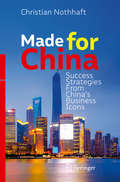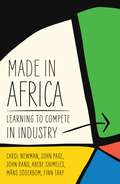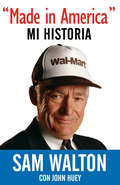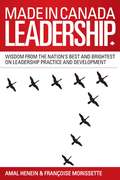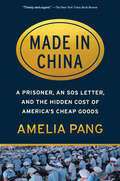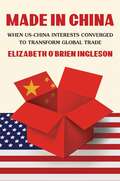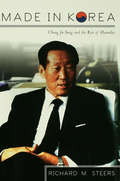- Table View
- List View
Made From Scratch: The Legendary Success Story of Texas Roadhouse
by Kent TaylorFrom founder Kent Taylor, the incredible made-from-scratch success story of Texas Roadhouse.In Made From Scratch, the late business maverick Kent Taylor tells the legendary story of Texas Roadhouse and in the process reveals its recipe for success: embracing unorthodox business practices. Because isn&’t it a little unusual for a company to do almost no advertising? Is it wild to give away free peanuts and rolls and keep prices low, even as costs rise, or to keep the menu basically the same since it opened? Does it fly in the face of reason to prohibit coats and ties at headquarters and to have a CEO who dressed like he was part of the landscaping crew? These business practices might be unconventional, but for Kent and Texas Roadhouse, they worked. What Kent and his Roadies cooked up is an island of misfits who are cool with being different. They love to have fun, but are serious about following meticulous recipes to serve up hand-cut steaks, fall-off-the-bone ribs, made-from-scratch sides, ice-cold beer, and irresistible fresh-baked bread. It&’s Legendary Food, Legendary Service, the Texas Roadhouse way. To show how this company became a staple of American dining and survived a once-in-a-lifetime pandemic, Kent took a trip back in time to offer the lessons learned from his pathbreaking life, revealing how a distracted kid from Louisville, Kentucky, created anything worthwhile at all.
Made In Britain: How the nation earns its living
by Evan DavisLooking at how Britain pays its way in the world today. Like Andrew Marr's HISTORY OF MODERN BRITAIN or Michael Palin's HIMALAYA, the book will have a coherence and life beyond the television series, mirroring its basic structure, but looking at some issues in greater depth, and telling additional stories to illustrate some of the ideas.This book is about the things that Britain produces in order to pay its way in the world, from physical goods that we can see and feel, to intangible services that are much harder to quantify. We don't have to be prejudiced in favour of certain types of value: we shouldn't assume finance is modern, and manufacturing out of date for example. What matters is what sells and for how much. From manufacturing to technology, design and the services industries, this book will provide a cutting edge analysis - via entertaining stories - about what we make and why it matters.
Made In Britain: How the nation earns its living
by Evan DavisWhat are countries famous for making? For Japan, the answer might be electronic goods. For Germany, automobiles. For France, perhaps a Louis Vuitton bag. But what about Britain?Here, Evan Davis sets himself the task of finding out. Offering a fascinating look at our manufacturing industries and revealing the various companies that might not be household names, but are very much world leaders in their fields, he shows how we have learnt to specialise in high end and niche areas that are the envy of the world. Taking in our disappointments and successes, Made in Britain is a brilliantly readable tour of our economic history, exploring the curious blend of resilience, innovation and economic free-thinking that makes us who we are.
Made In Britain: How the nation earns its living
by Evan DavisWhat are countries famous for making? For Japan, the answer might be electronic goods. For Germany, automobiles. For France, perhaps a Louis Vuitton bag. But what about Britain?Here, Evan Davis sets himself the task of finding out. Offering a fascinating look at our manufacturing industries and revealing the various companies that might not be household names, but are very much world leaders in their fields, he shows how we have learnt to specialise in high end and niche areas that are the envy of the world. Taking in our disappointments and successes, Made in Britain is a brilliantly readable tour of our economic history, exploring the curious blend of resilience, innovation and economic free-thinking that makes us who we are.
Made In Britain: How the nation earns its living
by Evan DavisLooking at how Britain pays its way in the world today. Like Andrew Marr's HISTORY OF MODERN BRITAIN or Michael Palin's HIMALAYA, the book will have a coherence and life beyond the television series, mirroring its basic structure, but looking at some issues in greater depth, and telling additional stories to illustrate some of the ideas.This book is about the things that Britain produces in order to pay its way in the world, from physical goods that we can see and feel, to intangible services that are much harder to quantify. We don't have to be prejudiced in favour of certain types of value: we shouldn't assume finance is modern, and manufacturing out of date for example. What matters is what sells and for how much. From manufacturing to technology, design and the services industries, this book will provide a cutting edge analysis - via entertaining stories - about what we make and why it matters.
Made In China: Women Factory Workers In a Global Workplace
by Pun NgaiAs China has evolved into an industrial powerhouse over the past two decades, a new class of workers has developed: the dagongmei, or working girls. The dagongmei are women in their late teens and early twenties who move from rural areas to urban centers to work in factories. Because of state laws dictating that those born in the countryside cannot permanently leave their villages, and familial pressure for young women to marry by their late twenties, the dagongmei are transient labor. They undertake physically exhausting work in urban factories for an average of four or five years before returning home. The young women are not coerced to work in the factories; they know about the twelve-hour shifts and the hardships of industrial labor. Yet they are still eager to leave home. Made in China is a compelling look at the lives of these women, workers caught between the competing demands of global capitalism, the socialist state, and the patriarchal family. Pun Ngai conducted ethnographic work at an electronics factory in southern China's Guangdong province, in the Shenzhen special economic zone where foreign-owned factories are proliferating. For eight months she slept in the employee dormitories and worked on the shop floor alongside the women whose lives she chronicles. Pun illuminates the workers' perspectives and experiences, describing the lure of consumer desire and especially the minutiae of factory life. She looks at acts of resistance and transgression in the workplace, positing that the chronic pains--such as backaches and headaches--that many of the women experience are as indicative of resistance to oppressive working conditions as they are of defeat. Pun suggests that a silent social revolution is underway in China and that these young migrant workers are its agents.
Made In Egypt: Gendered Identity and Aspiration on the Globalised Shop Floor
by Leila Zaki ChakravartiThis ground-breaking ethnography of an export-orientated garment assembly factory in Egypt examines the dynamic relationships between its managers - emergent Mubarak-bizniz (business) elites who are caught in an intensely competitive globalised supply chain - and the local daily-life realities of their young, educated, and mixed-gender labour force. Constructions of power and resistance, as well as individual aspirations and identities, are explored through articulations of class, gender and religion in both management discourses and shop floor practices. Leila Chakravarti's compelling study also moves beyond the confines of the factory, examining the interplay with the wider world around it.
Made In Space, Expectations Management, and the Business of In-Space Manufacturing
by Matthew C. Weinzierl Mehak SarangAfter having proven its base technology (3D printing) through NASA solicitations and contracts, Made In Space was searching for a viable commercial application. But the business case for the leading candidate, high-quality fiber optic cable for use on Earth, remained uncertain. In 2019, Made In Space secured a major contract from NASA for early work on a much grander project, called Archinaut, to build architectures in space that would enable off-Earth habitation. Was that opportunity a more promising path for Made In Space, or did its ambition risk distracting Made In Space from its more managed, incremental strategy? Which strategy would enable MIS to retain its central place in facilitating the development of the space economy?
Made Whole: The Practical Guide to Reaching Your Financial Goals
by Tiffany the Budgetnista AlicheThe ultimate hands-on workbook for anyone looking to get their finances in order—from budgeting to investing and everything in between—by Tiffany &“The Budgetnista&” Aliche, the New York Times bestselling author of the smash hit Get Good with MoneyWe all want to live within our means, save for retirement, invest a little, and yet still have some left over each month for fun. But as most people know, real life can get in the way of even our best intentions! To help us set realistic goals and keep us on track to meeting them, New York Times bestselling financial educator Tiffany &“The Budgetnista&” Aliche has an invaluable 10-step action plan: Made Whole. With her signature down-to-earth style, she offers worksheets, checklists, and action items for ten important building blocks—from the ins and outs of budgeting, investing, credit rating, and estate planning, to getting insurance and getting the flow of our money automated. A hardworking tool for getting our financial ducks in a row, it also includes:• Clear explanations of intimidating financial terminology• Simple instruction on calculating our present situation and future needs• Invaluable worksheets for keeping track of the numbers• Handy hacks for increasing your credit score, making savings &“hard to access,&” and finding support to stay on track to your goalsA masterclass in taking charge of your money, Made Whole has what every reader needs to achieve financial savvy, stability, and security.
Made You Look: How Advertising Works and Why You Should Know
by Shari GraydonIntended to educate children about advertising-talks about the history of advertising from ancient Greece, through the Industrial Revolution, down to digital advertising today.
Made for China
by Christian NothhaftThis book shares unique perspectives on the successful global evolution and future ambitions of Chinese consumer companies. It presents an unprecedented collection of one-on-one interviews with some of the most influential leaders in China, whose companies offer diverse products and services. Further, the book offers future business leaders encouragement and guidance on how to ride the consumer wave in China. It also investigates some of the foremost current trends, revealing the best opportunities for companies to succeed on the Chinese market. Written by a successful business leader, this book is a timely must-read for anyone seeking to understand Chinese consumers, the Chinese market and what makes Chinese entrepreneurs tick - helping them learn how to do business "Made for China".
Made for These Times: A Start-Up Guide to Calling, Character, and Work That Matters
by Katelyn Beaty Justin ZoradiIn fearful, uncertain times, how can we find significance in something greater than ourselves?Award-winning social entrepreneur Justin Zoradi was once haunted by this question as a young person daunted by the world's needs, yet wanting to make a difference. But when some friends from across the world invited him to join them, Justin said yes - and felt a small spark ignite within. That spark led to the founding of These Numbers Have Faces, a social enterprise investing in the next generation of African leaders.Made For These Times is a field guide to help you find your own spark as you remember who you were made to be. Through 26 power-packed microchapters, you will learn how to bolster ambition with character, dig deep to find your grit, and rise up to the challenges of today.Along the way, Justin weaves together compelling narrative, historical anecdotes, practical tips, and a six-part road map to equip you to join God in the work he is already doing. The result is a hope-filled blueprint for fighting back against fear and building a life of purpose.A life of significance isn't about what you are doing, it's about who you are becoming. In these trying times, God is calling you to be brave. Made For These Times is a rallying declaration that we cannot rely on the heroes of the past to engage the challenges of today. It's your turn – let this book be the spark you’ve been waiting for.
Made for This: 40 Days to Living Your Purpose
by Jennie AllenHave you ever asked yourself, &“Why am I here?&” Recognize your calling, find your place of service, and follow God to a life of purpose.This 40-day journey is for you—and it might surprise you. What if God hasn&’t hidden His purposes for your life from you? That life doesn&’t have to be so exhausting and heavy and confusing all the time? That God has given you everything you need to live out the calling He has placed on your life right this minute as you read this?In Made for This, a beautiful blend of bestselling books Anything and Restless, join Bible teacher Jennie Allen on a 40-day interactive journey that takes you through a step-by-step process to guide you in answering life&’s ultimate question.This unique book will help you:Stop living afraid and insecure by discovering how God can use your dreams and passions for a greater purposeIdentify the threads in your life and how they intentionally weave together Trade control and safety for a life of God-honoring adventure by praying one prayerDiscover how to fully surrender to God and identify the threads of gifts, passions, places, relationships, and sufferings in your life—not to get what you want, but to find what God wants of you.
Made in Africa: Learning to Compete in Industry
by John Page Abebe Shimeles Carol Newman John Rand Mans Soderbom Finn TarpThe role of industry in low income countries is important. Industry is good for growth, job creation, and poverty reduction. All of these factors depend on the size and the rate of growth of industry. Africa doesn't have enough industry to reach the Sustainable Development Goals for growth, job creation, and poverty reduction. Africa's share of global manufacturing has fallen from about three percent in 1970 to less than two percent in 2010. Why is there so little industry in Africa? Made in Africa: Learning to Compete in Industry outlines a new industrialization strategy to help Africa compete in global markets. This book draws on case study and qualitative research from Africa and emerging Asia to understand what drives firm-level productivity in low income countries. The results show that while traditional concerns such as infrastructure, skills, and the regulatory environment are important, they alone will not be sufficient for Africa to industrialize. The book also addresses how industrialization strategies willneed to adapt to the region's growing resource abundance.
Made in America: Mi Historia
by Sam Walton"Es una historia sobre el espíritu empresarial, el riesgo, y el trabajo duro, y sobre saber a dónde quieres ir y estar dispuesto a hacer lo que sea necesario para llegar allí. Es una historia sobre creer en tu idea, incluso cuando tal vez otras personas no creen en ella, y sobre apoyarte en tus mejores fortalezas". - Sam Walton Conozca a un genuino héroe popular americano proveniente del mero centro del corazón de los Estados Unidos: Sam Walton, un hombre que convirtió una única tienda de pueblo en Walmart, el negocio minorista más grande del mundo. Rey mercantil indiscutible de finales del siglo XX, Walton nunca perdió el toque de hombre común. Genuinamente modesto, pero siempre seguro de sus ambiciones y sus logros, Walton comparte su extraordinaria biografía con un estilo sincero y directo, y en sus propias palabras inimitables recuenta la historia de la inspiración, el corazón y el optimismo que lo impulsaron a alcanzar el sueño americano.
Made in America: Mi Historia (Biografias Ser.)
by Sam Walton"Es una historia sobre el espíritu empresarial, el riesgo, y el trabajo duro, y sobre saber a dónde quieres ir y estar dispuesto a hacer lo que sea necesario para llegar allí. Es una historia sobre creer en tu idea, incluso cuando tal vez otras personas no creen en ella, y sobre apoyarte en tus mejores fortalezas". - Sam WaltonConozca a un genuino héroe popular americano proveniente del mero centro del corazón de los Estados Unidos: Sam Walton, un hombre que convirtió una única tienda de pueblo en Walmart, el negocio minorista más grande del mundo. Rey mercantil indiscutible de finales del siglo XX, Walton nunca perdió el toque de hombre común. Genuinamente modesto, pero siempre seguro de sus ambiciones y sus logros, Walton comparte su extraordinaria biografía con un estilo sincero y directo, y en sus propias palabras inimitables recuenta la historia de la inspiración, el corazón y el optimismo que lo impulsaron a alcanzar el sueño americano.
Made in Canada Leadership: Wisdom from the Nation's Best and Brightest on the Art and Practice of Leadership (Jossey-Bass Leadership Series - Canada #26)
by Amal Henein Francoise MorissettePraise for Made in Canada Leadership "As an energy delivery company that takes great pride in our commitment to sustainable development, Enbridge recognizes that the leading, sustainable corporations of tomorrow must create an internal culture where leadership is fostered and nurtured at all levels. Made in Canada Leadership provides the roadmap for corporations seeking to secure their long-term future as industry leaders through the development and empowerment of any great company's strength—its people." —Patrick D. Daniel, President & CEO, Enbridge Inc. "Made in Canada Leadership makes a compelling case for a strategic and concerted approach to individual and collective leadership development to build our country’s leadership. If we want the right supply of leaders, we need to develop leadership in all sectors and at all levels. It is a long-term commitment and a collaborative endeavour. I am personally committed to rise to the challenge and engage in the leadership development movement and I hope others will join us in this quest for leadership." —Denise Amyot, Vice-President, Leadership Network, Public Service Human Resources Management Agency of Canada "Developing elite athletes who can win at the international level demands more than time, effort, resources, money and raw talent. It requires support systems that are effective and strategic and the mentoring of coaches who understand how to maximize not only the athletes’ physical potential but also their mental preparation. A similar case can be made for leader development. Made in Canada Leadership looks at what is needed to transform our leadership development efforts from amateur to major league. A must read!" —Chris Rudge, CEO and Secretary General, Canadian Olympic Committee "In our global world, human assets increasingly constitute the competitive advantage; and to succeed, quality leadership is required. However, leadership development is not a casual undertaking, but a long term investment and a shared responsibility. Nurturing future leaders offers significant ROI for all concerned: high returns for the organization and fulfilled leaders. Made in Canada Leadership provides an essential guide to the secrets of growing leaders from a strategic and Canadian perspective." —Paul Juniper, Director, Industrial Relations Centre, Queen’s University
Made in Chicago: The Windy City's Manufacturing Heritage (Images of America)
by Austin WeberFor much of the 20th century, the Chicagoland area was a manufacturing mecca due to its central geographic location and ready access to rail and water transportation. The city and suburbs mass-produced a wide range of products, including appliances, bicycles, electronics, furniture, globes, pianos, pinball machines, radios, railroad cars, sporting goods, telephones, televisions, typewriters, tools, toys, tractors, and watches. This book traces the origins of manufacturing in Chicago and explores the city's proud history of making steel and shaping metal. It also provides extensive coverage of the golden age of manufacturing in the region, including Chicago's unique contribution to the arsenal of democracy during World War II. The nostalgic journey includes stops at famous Chicago companies from the past, such as Bell & Howell, International Harvester, Pullman, Schwinn, Stewart Warner, Sunbeam, Western Electric, and Zenith.
Made in China: A Prisoner, an SOS Letter, and the Hidden Cost of America's Cheap Goods
by Amelia PangA Most-Anticipated Book of the Year: Newsweek * Refinery29 &“Timely and urgent . . . Pang is a dogged investigator.&” —The New York Times Book Review&“Moving and powerful.&” —Chris Hedges, Pulitzer Prize–winning journalist and author Discover the truth behind the discounts In 2012, an Oregon mother named Julie Keith opened up a package of Halloween decorations. The cheap foam headstones had been five dollars at Kmart, too good a deal to pass up. But when she opened the box, something shocking fell out: an SOS letter, handwritten in broken English. &“Sir: If you occassionally buy this product, please kindly resend this letter to the World Human Right Organization. Thousands people here who are under the persicuton of the Chinese Communist Party Government will thank and remember you forever.&” The note&’s author, Sun Yi, was a mild-mannered Chinese engineer turned political prisoner, forced into grueling labor for campaigning for the freedom to join a forbidden meditation movement. He was imprisoned alongside petty criminals, civil rights activists, and tens of thousands of others the Chinese government had decided to &“reeducate,&” carving foam gravestones and stitching clothing for more than fifteen hours a day. In Made in China, investigative journalist Amelia Pang pulls back the curtain on Sun&’s story and the stories of others like him, including the persecuted Uyghur minority group whose abuse and exploitation is rapidly gathering steam. What she reveals is a closely guarded network of laogai—forced labor camps—that power the rapid pace of American consumerism. Through extensive interviews and firsthand reportage, Pang shows us the true cost of America&’s cheap goods and shares what is ultimately a call to action—urging us to ask more questions and demand more answers from the companies we patronize.
Made in China: When US-China Interests Converged to Transform Global Trade
by Elizabeth O’Brien InglesonThe surprising story of how Cold War foes found common cause in transforming China’s economy into a source of cheap labor, creating the economic interdependence that characterizes our world today.For centuries, the vastness of the Chinese market tempted foreign companies in search of customers. But in the 1970s, when the United States and China ended two decades of Cold War isolation, China’s trade relations veered in a very different direction. Elizabeth Ingleson shows how the interests of US business and the Chinese state aligned to reframe the China market: the old dream of plentiful customers gave way to a new vision of low-cost workers by the hundreds of millions. In the process, the world’s largest communist state became an indispensable component of global capitalism.Drawing on Chinese- and English-language sources, including previously unexplored corporate papers, Ingleson traces this transformation to the actions of Chinese policymakers, US diplomats, maverick entrepreneurs, Chinese American traders, and executives from major US corporations including Boeing, Westinghouse, J. C. Penney, and Chase Manhattan Bank. Long before Walmart and Apple came to China, businesspeople such as Veronica Yhap, Han Fanyu, Suzanne Reynolds, and David Rockefeller instigated a trade revolution with lasting consequences. And while China’s economic reorganization was essential to these connections, Ingleson also highlights an underappreciated but crucial element of the convergence: the US corporate push for deindustrialization and its embrace by politicians.Reexamining two of the most significant transformations of the 1970s—US-China rapprochement and deindustrialization in the United States—Made in China takes bilateral trade back to its faltering, uncertain beginnings, identifying the tectonic shifts in diplomacy, labor, business, and politics in both countries that laid the foundations of today’s globalized economy.
Made in Italy and the Luxury Market: Heritage, Sustainability and Innovation (Routledge Studies in Luxury Management)
by Serena Rovai Manuela De CarloMade in Italy holds a highly significant position in the global luxury market, as an economic, cultural and social phenomenon and textbook example of the country-of-origin effect. Whilst in the past luxury was conceptualised as an exclusive benefit of the few, it is now a highly diversified ecosystem with disruptive challenges to its identity and authenticity, led by new customer segments. This book - through an analysis of diverse cases - answers the key issues in the industry of the new Made in Italy luxury, with a particular focus on sustainability. The book provides an in-depth view into luxury Made in Italy, from historical roots, heritage and tradition to major forces of change and innovative, entrepreneurial adaptations in the twenty-first century. It situates Made in Italy in the broader global context of change, with regards to the call for sustainable manufacturing and consumption. Written by an international pool of academics and experts in luxury brand management, the book presents a series of case studies to explore how the industry is responding to new consumer expectations and demand to maintain competitive advantage. This unique collection will be of interest for academics, scholars and upper-level students across the fields of luxury management and marketing, brand management, consumer behaviour as well as sustainability.
Made in Japan (Routledge Library Editions: Japan)
by Guenther SteinThis volume concentrates on the effect of Japanese trade competition on the UK and Europe, it also provides an illuminating picture of political, social and military conditions in Japan in the early twentieth century.
Made in Korea: Chung Ju Yung and the Rise of Hyundai
by Richard M. SteersAmerican business folklore is awash with the adventures of successful entrepreneurs. Still, most of these stories are about Americans, neglecting important and courageous entrepreneurs from other countries. Made in Korea recounts the story of how Chung Ju Yung rose from poverty to build one of the world's largest and most successful building empires - Hyundai - through a combination of creative thinking, tenacity, timing, political skills, and a business strategy that few competitors ever understood. Chung entered the shipbuilding business with no experience and went on to create the world's largest shipyard. He began making automobiles when foreign experts unanimously predicted he would fail, and he started a global construction company that has built some of today's greatest architectural wonders. He even convinced the International Olympic Committee to select South Korea over Japan as the site for the highly successful 1988 Olympics. Unlike most CEO's of major firms, Chung has always preferred the company of his workers to that of the global executive elite. Hard work, creativity and a capacity to never give up - this is the essence of Chung's life. In each of his ventures, he exhibited a sheer determination to succeed, regardless of the obstacles, and he worked tirelessly to instil this drive in all of his employees. Even today, in the midst of Korea's worst economic crisis in over four decades, Chung's company is busy implementing plans to emerge as an even stronger contender in the world economy. Illustrated with 32 pages of colour photographs not previously seen in the West, including photos of Chung's recent historic visit to North Korea in 1998, Made in Korea takes stock of Chung's entire life, highlighting both his contributions to society and the lessons his work can teach to aspiring entrepreneurs.
Made in Mexico: Regions, Nation, and the State in the Rise of Mexican Industrialism, 1920s–1940s
by Susan M. GaussThe experiment with neoliberal market-oriented economic policy in Latin America, popularly known as the Washington Consensus, has run its course. With left-wing and populist regimes now in power in many countries, there is much debate about what direction economic policy should be taking, and there are those who believe that state-led development might be worth trying again. Susan Gauss’s study of the process by which Mexico transformed from a largely agrarian society into an urban, industrialized one in the two decades following the end of the Revolution is especially timely and may have lessons to offer to policy makers today.The image of a strong, centralized corporatist state led by the Partido Revolucionario Institucional (PRI) from the 1940s conceals what was actually a prolonged, messy process of debate and negotiation among the postrevolutionary state, labor, and regionally based industrial elites to define the nationalist project. Made in Mexico focuses on the distinctive nature of what happened in the four regions studied in detail: Guadalajara, Mexico City, Monterrey, and Puebla. It shows how industrialism enabled recalcitrant elites to maintain a regionally grounded preserve of local authority outside of formal ruling-party institutions, balancing the tensions among centralization, consolidation of growth, and Mexico’s deep legacies of regional authority.
Made in USA: Cómo entender a los Estados Unidos
by Guy SormanSorman, periodista y ensayista francés, dibuja un panorama de losEstados Unidos desde el lugar de quien se pasea por ahí sin prisas. Su particular descubrimiento de América empieza en el año 1962 y terminaen 2004,locual permite al autor presentar y analizar un amplio abanicode cambios ocurridos en este período en los Estados Unidos y en cuanto ala actitud de Europa frente a ese país.
